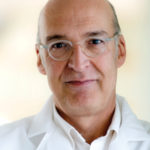While rheumatology has a reputation as one of the “happiest specialties” in medicine, stress and burnout are still common in today’s healthcare environment.
The Mindful Rheumatologist & the Science of Stress from 11:00 am – 12:30 pm Wednesday in Room 11 A will feature a panel of experts discussing the importance of empathy in driving healthcare outcomes, factors leading to physician burnout and how organizations can engage strategies to address it, and the cellular impact of stress and how it can affect both the health of physicians and the recommendations they make for their patients.

The ways in which empathy and compassion contribute to the care of patients with rheumatic diseases will be the topic of a presentation by Leonard H. Calabrese, DO, Professor of Medicine and Vice Chair of the Department of Rheumatic and Immunologic Diseases at the Cleveland Clinic Lerner College of Medicine of Case Western Reserve University.
“Empathy is often considered to be an almost ineffable quality, but in the context of medical humanism, we define it as a cognitive attribute that involves an understanding of the experiences, concerns, and perspectives of patients, combined with a capacity to communicate this understanding to them with an intention to help,” Dr. Calabrese said. “There are dimensions of illness in patients that extend beyond the signs and symptoms of the disease and the diagnosis that we give them, and that has to do with how patients contextualize their disease and how this affects them in mind, body, and spirit.”
Dr. Calabrese said some scientific data suggest that physicians who demonstrate and effectively communicate empathy provide higher quality care and have more satisfied patients.
“But where does empathy come from? We don’t really know if it’s something that we’re merely born with or if it is something that we learn, or alternatively, if it is something that we are capable of losing,” Dr. Calabrese said. “There is qualitative and quantitative science to suggest that, generally speaking, physicians start their careers with empathy very high, and then somewhere around the third year of medical school, there is a deep dive in empathy for about two-thirds of students, and it stays low throughout training.”
A potential explanation, Dr. Calabrese said, is the effect that can occur when the realities of the demands and uncertainties of patient care and the difficulties and challenges of the profession temper the idealism behind the choice to pursue a career in healthcare.
“There are things that can be done to augment empathy, including mindfulness and meditation techniques,” Dr. Calabrese said. “Practicing self-care, having a good work-life balance, having trusted colleagues to confide in — these are all things that go into the formula for buffering and building empathy.”

Neda Gould, PhD, will talk about the science of stress and offer some practical tips for physicians for using mindfulness techniques to ameliorate stress and avoid burnout. Dr. Gould is Assistant Professor of Psychiatry and Behavioral Sciences at the Johns Hopkins University School of Medicine, Director of the Mindfulness Program, and Associate Director of the Johns Hopkins Bayview Anxiety Disorders Clinic in Baltimore, MD.
“Mindfulness is a very popular term right now that gets thrown around a lot, but there is compelling evidence that the actual practice of mindfulness meditation can relieve stress, reduce the symptoms of burnout, and improve well being,” Dr. Gould said. “For example, because much of our distress can lie in our thoughts about something that happened in the past or something we’re anticipating is going to happen in the future, bringing our attention back to the reality of the present is one way we can begin to reduce our stress.”
She said there are many different techniques one can learn and practice to achieve this, including what she calls the “three breath break.”
“It’s literally just about taking a moment now and then to simply pause and take three deep breaths. Sometimes I will do it before I go see a patient, for example, but I make a point to do it at least a couple times a day as a way to come back to the present and notice what is happening in the moment,” Dr. Gould said. “Minor interventions like this can actually reset our stress response to a degree and build the mindfulness muscle that can, over the long term, result in a sense of relaxation, improved well being, and decreased stress.”
Also during this symposium, Liselotte Dyrbye, MD, MHPE, of the Mayo Clinic in Rochester, MN, will appraise the factors contributing to physician burnout and offer strategies to address those factors.
